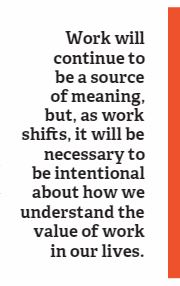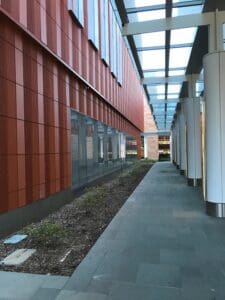Editor’s note: Commercial Integrator has teamed up with the IMCCA, the New York-based non-profit industry association for unified communication and workplace collaboration, to produce a quarterly supplement, titled Collaboration Today and Tomorrow, that focuses on all things collaboration from multiple perspectives.
The future is a hot topic. Predicting, discussing and debating what’s coming next is top of mind for many. And it’s no wonder: Based on the disruption of the last few years, this will be the most significant reinvention of work and learning in our experience.
Of course, the reset may vary from region to region, industry to industry, or job to job. But, overall, the changes will be significant. Part of the reason is that the nature of work and the ways we work have risen to new levels of awareness. People are thinking about how, where and when they work more than they did in the past. And they are acutely aware of why they’re working, as well as for whom and with whom they work. And they’re aware of how learning occurs and how learning prepares students for work, as well.
These dynamics prime both work and learning for reimagination. The changes are inevitable, and we must be prepared for them.
Digital Download: Collaboration Today and Tomorrow: Spring 2023 Edition
The Power of Optimism
In reality, the future of work is a bit of a misnomer. No one really knows what’s coming. Anyone can call themselves a futurist, but few people are doing more than reading signals and doing their best to distinguish them from noise.
In addition, the future of work will be amorphic; thus, predicting a particular end point is inherently flawed. The future will continue to arrive differently based on who you are, where you live and the business or organization you’re considering. And of course, people will interpret the future differently. Like the blind men touching the elephant, you may sense the trunk while someone else experiences the leg. The picture will be most complete with multiple points of view.
But it’s still valuable to anticipate as much as we can.

Technology can create distance, but it can also connect us. Together, we must be judicious about the choices we make to ensure they are nurturing what makes us human. Photo courtesy of Tracy Brower.
Leadership is a fundamentally hopeful and optimistic venture. Those who lead (whether in formal leadership roles or as individual contributors) are necessarily looking to the future. Sharing a vision, setting goals, clarifying expectations and planning for results are necessarily optimistic efforts, focusing on what will come next and how to achieve it. So, understanding the context of that work and learning is time well spent.
Optimism about the future also sets the bar. If people lack hope about the future, they are off the hook. That is to say, in that circumstances, they have no need or requirement to advocate for change or bring about improvement. But when people are forward looking, responsibility comes along with it. Those people have the obligation to consider how things can be better, based on individual and collective effort.
Creating the Future
One of the best things about the future is people’s ability to create it. Rather than standing by as passive recipients of what’s to come, people can create the conditions for a positive, constructive and empowering experience. The primary way people learn is through watching, listening to and experiencing others. Thus, your influence and impact are likely greater than you may believe.
In addition, human cognitive biases dictate that what people focus on and emphasize is more likely to become magnified. These factors mean that people’s attention and intentions are important factors in what becomes reality as time marches on.
Evolving technology will be part of every aspect of the future — intertwined, integrated, influenced and influencing. Likewise, culture is context for every feature in the future. It is the way things get done, our common belief systems and our united ways of being. Therefore, it, too, both impacts and is impacted by the future of work and learning.
How Things Will Change: The Role of Work
The narrative about work has become extraordinarily negative. “Quiet quitting” and the mantra to do as little as possible are at the forefront of the popular press. Unfortunately, the script ignores the value of work. For people’s collective mental and emotional well-being, this will need to change.
It’s true that many organizations will need to do better in supporting people and creating the conditions for happiness and engagement, but it’s also critical to embrace the reality that people have an instinct to matter. And work is, of course, an important way that people contribute to communities, express their skills and talents, and enhance a sense of mattering in their lives. Bottom line: Work is an important part of life; it’s not separate from it.
Related: To Quit or Not to Quit (Quietly)
Work matters to people’s ability to contribute and connect. Distributive justice requires people share equitably in rewards, and contributive justice requires people have equitable opportunities to make a difference to the group and society. All work has dignity. Indeed, work is an avenue to finding meaning, connection and contribution.
 Likewise, learning is something to which people want to contribute, whether through mentoring, sharing or teaching (both formally and informally). Learning and growth are strongly correlated with happiness, and learning is most motivating when it’s in pursuit of a positive future of work rather than a future in which work is a dismal detraction from the rest of life.
Likewise, learning is something to which people want to contribute, whether through mentoring, sharing or teaching (both formally and informally). Learning and growth are strongly correlated with happiness, and learning is most motivating when it’s in pursuit of a positive future of work rather than a future in which work is a dismal detraction from the rest of life.
The Implication: Work must be valued for the role it plays in people’s lives and in society. Rather than all work being a grind, the future requires hope for how the conditions for work can become better than they are. Learning matters as well. After all, the process of learning is work for staff and faculty. It is also the work of students, preparing the way for meaningful employment in the next chapter of life.
We require a culture that values work, workers and workplaces (both virtual and physical). We will need to ensure work has meaning for people as technology continues to make some jobs unnecessary, creates other jobs and replaces portions of others. Work will continue to be a source of meaning, but as work shifts, it will be necessary to be intentional about how we understand the value of work in our lives.
How Things Will Change: Well-Being and Connection
Connections with others are fundamental to physical, cognitive and emotional well-being. In fact, having one or two close friends is more important to health outcomes (think heart disease, diabetes, depression or dementia) than smoking, exercise or diet. This is true for both introverts and extroverts.
In addition, simple, quick interactions contribute to happiness and well-being. Unfortunately, conveniences have reduced day-to-day exchanges. Tech has allowed people to order coffee on the app rather than talking with the barista and to receive prompt deliveries on their doorstep, without the need to chat with a checkout clerk. Levels of loneliness, depression, anxiety and mental-health challenges are at all-time high. Those things are correlated with our greater distance from each other, both in terms of day-to-day interactions and in terms of remote work.

Work and learning will be places where well-being and connection are created and sustained. Photo courtesy of Tracy Brower.
With this distance, the role of work is becoming more central to relationships, connections and the well-being that comes with these. Work is the perfect place to make friends or just to foster collegial connections. When you’re working with others, you unite around common goals, you get to know them over time, you relate through both tasks (rolling up sleeves to solve the customer issue) and relationships (at the coffee machine sharing stories about the weekend) and you see them on good days and bad.
The context of work nurtures interactions and relationships. So, in the future, it will be fundamental to health. Learning environments share this level of importance. That’s true for those who work in learning fields, but it’s especially true for students for whom school is a place to understand themselves in relation to others, as well as to establish individual and shared identities.
Expectations for well-being and organizations’ support for it are also shifting. As more people struggle, there is greater awareness and dialogue about challenges. And organizations are increasingly expected not only to create the conditions for health but also to respond when people struggle, whether by offering programs and approaches or potential solutions. All of these will make well-being a priority for organizations, a point of accountability for them, and a factor in attracting and retaining employees and students.
The Implication: Work and learning will be places where well-being and connection are created and sustained. Tech can create distance, but it can also connect people. So, we’ll need to be judicious about the choices we make to ensure they are nurturing human relationships. And we’ll need cultures that foster trust, proximity (virtual and physical) and respect so that people feel known, appreciated and connected.
How Things Will Change: The Value Equation
Another element primed for change is the relationship between people and organizations. The employee value equation has always driven attraction, retention and engagement, but the stakes will rise as gig work becomes reality. According to some estimates, those who work independently are on track to surpass the fulltime workforce by 2027. This means that what organizations offer will be a constant source of assessment and decision-making by freelancers, who will decide again and again how much they want to work and for whom. They’ll be facilitated in that by technology that allows them to reach employers, work from anywhere and do so in all kinds of new ways.
Organizations will need to offer great experiences and constructive cultures. That means fostering an inspiring and strong direction and then balancing it with opportunities for participation and involvement. Organizations will need to sustain cultures that offer consistency and clear processes balanced with adaptability, agility and responsiveness.
Choice and control are significantly correlated with greater engagement, motivation and performance for all kinds of workers and learners. So, the experience of work and learning will need to be flexible, offering plenty of options and alternatives within clear boundaries and guardrails that balance individual, team and organizational needs.
Organizations that attract, retain and engage most successfully will be the ones that offer purpose, meaningful work, great leadership, collegiality and opportunities for people to learn, grow and stretch.
The Implication: Work and learning will need to serve people and organizations, and choice within appropriate limits will be critical.
How Things Will Change: Measurement
It’s true that what gets measured gets done. Accordingly, organizations will need to shift what they measure and how they hold people accountable. Increasing data is demonstrating the links between happiness, engagement and performance. Measurement systems of the future will need to appreciate the links between these and their reciprocal relationships with each other. Moreover, it’s essential to recognize and reward people appropriately.
Rather than having a narrow focus on how much and how fast, organizations will be more effective when they measure broader sets of outcomes. The corollary for learning environments is to prepare students to make contributions through their commitment, creativity and performance.
Technology allows for surveillance, tracking and monitoring at levels unknown in the past, but these will need to be balanced with empowerment and a respect for privacy. Accountability is constructive, driving performance, feedback, improvement, equity and even positive relationships. People want to do a good job, receive information about how to improve and receive recognition when things are humming along.
The Implication: Tracking and monitoring will work best within cultures of trust and psychological safety. When people feel supported, feel they can be themselves and when they can take appropriate risks, innovation thrives. So, a culture of openness and appreciation must surround approaches to what gets measured, how it’s measured and how the information is used.
How Things Will Change: Skills
With so many shifts in circumstances, people’s skills and capabilities will need to evolve as well. The talent revolution (aka The Great Resignation) is perhaps the best evidence that work wasn’t working for many people.

Optimism is an engine for improvement because it reinforces responsibility, obligation and commitments to reach other, while shaping how people work and learn together. Photo courtesy of Tracy Brower.
The best leaders have risen to the occasion of our disruption, but there are more skills they must develop. Leaders will need to lead differently with the complexities of where and how people are working, and people will need to interact and collaborate differently as well. Technology drives new ways of communicating, collaborating and performing. And an ability to deliver results leveraging all kinds of tech will be a requirement for those who are successful.
In addition, people will need not merely to tolerate ambiguity but to embrace it. They will need to enhance curiosity and openness to ideas different from their own. The algorithms on social platforms arguably work too well, delivering information people already agree with and giving them a false sense about the extent to which their opinions are shared by others. But learning, creativity and progress will require the ability to inquire and understand ideas that are unfamiliar, as well as learn from those who may come from very different places (literally and figuratively). In addition, people will need to build skills in empathy, and be intentional about tuning in, asking questions, listening and being present for others.
Whether they’re working or learning, people will need to acquire skills quickly, leverage new technology as it comes online at lightning speed, and change what they do and how they do it. People will need to expand their adaptability and resilience. Organizations will have a responsibility to provide learning for people, even if their tenure at any individual college, university or work setting is relatively short.
Tech will drive the need for new learning — how to use it, how to work differently under its influence and how to bring unique human talents to any efforts. Tech will also facilitate new learning, as people can learn faster, in a more personalized manner, from anywhere. Cultures will need to foster an openness to failure, sharing and learning. Because organizations that learn and adapt must be composed of people who learn, whether through formal channels or side by side with colleagues as work happens.
The Implication: In a future characterized by ambiguity and the high speed of change, testing, trying, failing and improving will be critical to the success in the future, individually, in teams and for organizations.
A Bright Future
Change is inevitable, and the future is bright if we make it so. Optimism is an engine for improvement because it reinforces responsibility, obligation and commitments to each other, while shaping how people work and learn together. In reality, the future is now, and we have the opportunity to consider our tremendous influence on all we are capable of creating as individuals, as teams and as organizations.
Download a digital version of the Spring 2023 Collaboration Today and Tomorrow issue here.
For the latest Collaboration Today and Tomorrow content, check back quarterly on CommercialIntegrator.com.
Tracy Brower, PhD, is an author, sociologist and vice president of workplace insights with Steelcase.










